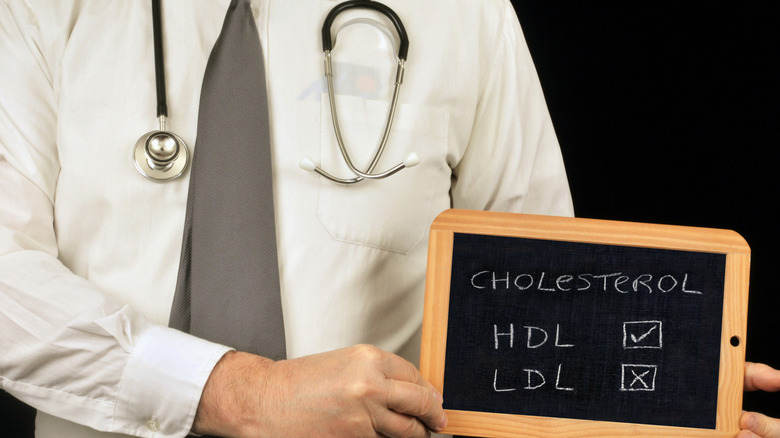Your Cholesterol Could Go Up If This Happens To Your Testosterone
Even if you lead a generally healthy lifestyle, you could wind up with elevated cholesterol. In fact, there are some common conditions and sneaky causes that may lead to high cholesterol, including changes in your testosterone levels.
That said, the relationship between testosterone and high cholesterol hasn't been clearly defined. If your testosterone goes down (which you may find out if you experience the warning signs of low testosterone), your cholesterol won't necessarily skyrocket. Plus, even if your cholesterol goes up, you might discover that you're still getting a bit of a health benefit. In a 2022 study in the International Journal of Endocrinology, male rats were either fully castrated, partially castrated, or not castrated. After six weeks, rats from the first two groups showed higher cholesterol levels than rats in the third group. However, there was a catch: All cholesterol types in the rats rose, including high-density lipoprotein (HDL) cholesterol.
Unlike low-density lipoprotein (LDL) cholesterol ("bad" cholesterol), HDL ("good") cholesterol doesn't cause harmful plaque buildup in your blood vessels. On the contrary, HDL cholesterol helps excess cholesterol get to the liver, where it can be effectively processed. Therefore, though having low testosterone brought about increased LDL cholesterol in the study rats, it at least raised their protective HDL cholesterol as well.
The relationship between testosterone and cholesterol: Conflicting findings
A 2007 study in the Asian Journal of Andrology came to a different conclusion regarding the testosterone-cholesterol relationship. Male subjects with and without existing heart disease were examined to determine if there was a link between their total testosterone and cholesterol levels. In both groups of men, high total testosterone seemed to predict high HDL cholesterol. For every five nanomoles per liter (nmol/L) jump in testosterone a man had, he could expect to see a 2% to 6% rise in his HDL cholesterol. The 2007 study findings would appear to contradict the conclusions of the 2022 study (e.g., that low testosterone brought about high HDL cholesterol), or at least hint that protective HDL cholesterol may get a boost whether testosterone falls or rises.
But what about a possible link between testosterone and total cholesterol? A 2012 study published in Substance Abuse Treatment, Prevention, and Policy looked at what would happen when adult men with normal testosterone levels received an injection (500 milligrams) of testosterone. Within two days, their total cholesterol levels rose by an average of 15%; after 15 days, their levels returned to baseline.
Is testosterone replacement therapy a solution for low testosterone?
For years, researchers have tried to definitively determine the effect that testosterone may have on cholesterol. But since studies have produced varying conclusions, even experts like Dr. Khurram Nasir of Houston Methodist aren't quite sure whether to advise testosterone replacement therapy as a treatment for men who have low testosterone and cardiovascular problems like high cholesterol.
Noted Dr. Nasir, "Based on what we know about the association between testosterone deficiency and metabolic issues, impaired glucose metabolism, poor cholesterol levels and inflammation — all of which are themselves linked to heart disease — we can infer that testosterone deficiency is also associated with poor heart health." That said, Dr. Nasir cautions against prescribing testosterone therapy for every man with low testosterone since individual risk factors may make the therapy unwise.
Regardless of whether your testosterone is high, normal, or low, if you also have cholesterol concerns, you should probably set up an appointment with a trusted doctor. After all, high cholesterol puts you at risk of stroke and other life-threatening cardiovascular events. Plus, there can be hidden dangers of low testosterone, leading to conditions like osteoporosis. Your doctor can provide proven solutions based on your history and lifestyle, as well as help you keep an eye on both your testosterone and cholesterol levels.


